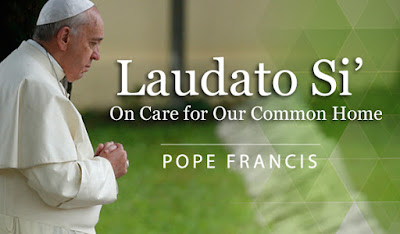We have been looking at the implications of receiving Holy Holy Communion in the Mass. Holy Communion also puts us in a communion with the creation. Recall that "communion" is a sharing of a deep relationship with another or, in this case, with creation. Fr. Teilhard de Chardin wrote:
"There is a communion with the earth, and a communion with God, and a communion with God through the earth."
That last point, "a communion with God through the earth," is one way to express the sacramentality of the Catholic Tradition. By this is meant that creation and human relationships can reveal God’s Presence to us. Or to put it another way, God’s life is mediated to us through the creation and human relationships, the supreme revelation being the Son of God who entered creation in human flesh as Christ Jesus (sometimes Christ is described as the Sacrament of God). The Church takes some of these ways of mediation and names them as Sacraments of the Church," "visible signs of the invisible God."
Recall that in the Offertory we bring bread and wine to the altar and these will be used in the Eucharistic Sacrifice. The Risen Christ will become Really Present through these created signs.
In offering the bread and wine, we are offering creation and human work for the purposes of God’s communication of salvation to us:
"Blessed are you, Lord God of all creation,
for through your goodness we have received
the bread we offer you:
fruit of the earth and work of human hands,
it will become for us the bread of life."
"Blessed are you, Lord God of all creation,
for through your goodness we have received
the wine we offer you:
fruit of the vine and work of human hands
it will become our spiritual drink."
Reflecting on the role the things of earth play in the Eucharist, a priest and liturgical theologian, Fr. Kevin Irwin, who has written about the subject of sacramentality and ecology, puts it very simply:
"For me the earth is brought into the act of worship and the act of worship sends us back to life on this good earth." ( From Interview HERE)
One of the gifts that modern ecology gives us is an understanding of how everything in our world is "inter-connected" and "inter-related." This is also the insight of the sacramental view espoused by the Catholic Church, especially in its teaching about creation:
"God wills the interdependence of creatures. The sun and the moon, the cedar and the little flower, the eagle and the sparrow: the spectacle of their countless diversities and inequalities tells us that no creature is self-sufficient. Creatures exist only in dependence on each other, to complete each other, in the service of each other." (Catechism #340)
This truth also applies to the human person. We were created from the earth and we do not live apart from the earth. We exist within creation. We are in relationship with creation.
The Eucharist and especially Holy Communion can express this Communion with Creation and, of course, with Creation’s Creator.
Pope Francis, in his recent Encyclical on the care of creation, Laudato Si, relates such care to the Eucharist:
"It is in the Eucharist that all that has been created finds its greatest exaltation. Grace, which tends to manifest itself tangibly, found unsurpassable expression when God himself became man and gave himself as food for his creatures. The Lord, in the culmination of the mystery of the Incarnation, chose to reach our intimate depths through a fragment of matter. He comes not from above, but from within, he comes that we might find him in this world of ours.
"In the Eucharist, fullness is already achieved; it is the living centre of the universe, the overflowing core of love and of inexhaustible life. Joined to the incarnate Son, present in the Eucharist, the whole cosmos gives thanks to God. Indeed the Eucharist is itself an act of cosmic love: ‘Yes, cosmic! Because even when it is celebrated on the humble altar of a country church, the Eucharist is always in some way celebrated on the altar of the world’.
"The Eucharist joins heaven and earth; it embraces and penetrates all creation. The world which came forth from God’s hands returns to him in blessed and undivided adoration: in the bread of the Eucharist, ‘creation is projected towards divinization, towards the holy wedding feast, towards unification with the Creator himself’.Thus, the Eucharist is also a source of light and motivation for our concerns for the environment, directing us to be stewards of all creation." (#236; emphasis added)
Denis Edwards writes in Ecology at the Heart of Faith:
"Tony Kelly has said, that the ‘most intense moment of our communion with God is at the same time an intense moment of our communion with the earth.’ By being taken up into God, we are caught up into God’s love for the creatures of our planetary community. This begins to shape our ecological imagination: ‘The Eucharist educates the imagination, the mind, and the heart to apprehend the universe as one of communion and
connectedness in Christ.’"
Certainly this sacramental view of creation and our relationship with creation is celebrated in the Mass and deepened by our Communion with creation in God’s care of the world.
Next Week: Communion Rite Part 8: Communion in the Kingdom of God in Heaven and on Earth




